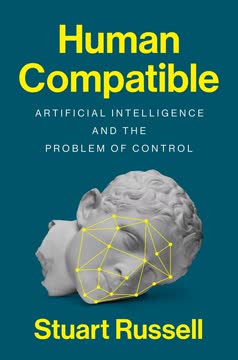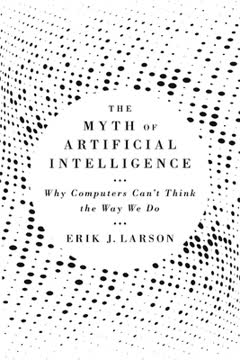Key Takeaways
1. AI is the most important general-purpose technology of our era, driving economic growth
"The most important general-purpose technology of our era is artificial intelligence, particularly machine learning (ML)—that is, the machine's ability to keep improving its performance without humans having to explain exactly how to accomplish all the tasks it's given."
AI as a catalyst: Artificial intelligence, especially machine learning, is poised to transform every industry, much like electricity did a century ago. It's projected to create $13 trillion of GDP growth by 2030, with most of this growth occurring in non-internet sectors such as manufacturing, agriculture, and healthcare.
Widespread impact: AI's influence extends beyond just automation. It's enabling new products, services, and business models across various sectors. For example:
- In healthcare, AI is assisting in disease diagnosis and treatment planning
- In finance, AI is revolutionizing fraud detection and investment strategies
- In retail, AI is personalizing customer experiences and optimizing supply chains
Economic implications: As AI becomes more prevalent, it will not only increase productivity but also create new jobs and industries. However, it will also disrupt existing business models and require significant workforce adaptation.
2. Machine learning enables computers to improve performance without explicit programming
"The most important thing to understand about ML is that it represents a fundamentally different approach to creating software: The machine learns from examples, rather than being explicitly programmed for a particular outcome."
Paradigm shift: Traditional software development involves programmers writing explicit instructions for every task. Machine learning, however, allows computers to learn from data and improve their performance over time without being explicitly programmed for each scenario.
How it works:
- Training data: ML systems are fed large amounts of labeled data
- Pattern recognition: Algorithms identify patterns in the data
- Model creation: Based on these patterns, a model is created
- Prediction/Decision making: The model is then used to make predictions or decisions on new, unseen data
Applications: This approach has enabled breakthroughs in:
- Image and speech recognition
- Natural language processing
- Autonomous vehicles
- Predictive maintenance
- Personalized recommendations
3. AI excels in perception and cognition tasks, surpassing human performance in many areas
"Machine learning systems are not only replacing older algorithms in many applications, but are now superior at many tasks that were once done best by humans."
Perception tasks: AI has made significant strides in:
- Computer vision: Image recognition, object detection
- Speech recognition: Transcription, voice commands
- Natural language processing: Translation, sentiment analysis
Cognition tasks: AI is increasingly capable in:
- Problem-solving: Game-playing (e.g., chess, Go), optimization problems
- Decision-making: Financial trading, medical diagnosis
- Creativity: Art generation, music composition
Superhuman performance: In many domains, AI now outperforms humans:
- Medical image analysis: Detecting diseases from X-rays or MRIs
- Fraud detection: Identifying anomalous financial transactions
- Quality control: Spotting defects in manufacturing processes
However, it's important to note that AI still struggles with tasks requiring general intelligence, common sense reasoning, and emotional intelligence.
4. Businesses must reimagine processes to fully leverage AI's potential
"Reimagining a business process involves more than the implementation of AI technology; it also requires a significant commitment to developing employees with what we call "fusion skills"—those that enable them to work effectively at the human-machine interface."
Process transformation: Simply applying AI to existing processes often yields limited benefits. Instead, companies should:
- Identify core business processes that could benefit from AI
- Reimagine these processes from the ground up with AI capabilities in mind
- Consider how AI can enhance:
- Flexibility
- Speed
- Scale
- Decision-making
- Personalization
Examples of reimagined processes:
- Predictive maintenance in manufacturing
- AI-assisted product design
- Automated customer service with intelligent chatbots
- Dynamic pricing in retail and e-commerce
Organizational change: Successful AI implementation often requires:
- New roles and skills within the organization
- Changes to organizational structure and workflows
- A culture that embraces data-driven decision making
5. Human-AI collaboration is key to maximizing the value of artificial intelligence
"The most effective rule for the new division of labor is rarely, if ever, 'give all tasks to the machine.' Instead, if the successful completion of a process requires 10 steps, one or two of them may become automated while the rest become more valuable for humans to do."
Collaborative intelligence: The most successful AI implementations leverage the strengths of both humans and machines:
- Human strengths: Creativity, empathy, strategic thinking, ethical judgment
- AI strengths: Data processing, pattern recognition, tireless execution
Roles for humans: In AI-augmented processes, humans often:
- Train AI systems with high-quality data
- Interpret and explain AI outputs, especially in critical decisions
- Provide oversight and ensure ethical use of AI
Examples of effective collaboration:
- Radiology: AI assists in image analysis, while doctors make final diagnoses
- Customer service: Chatbots handle routine inquiries, humans manage complex issues
- Financial advising: AI provides data-driven insights, human advisors offer personalized guidance
Skill development: Organizations must invest in developing "fusion skills" that enable employees to work effectively alongside AI systems.
6. AI adoption requires careful consideration of data, ethics, and organizational readiness
"For organizations to get the most that they can from AI, they should also be investing in helping all of their team members to understand the technology better."
Data considerations:
- Quality and quantity of available data
- Data privacy and security concerns
- Bias in training data leading to biased AI outputs
Ethical considerations:
- Transparency and explainability of AI decisions
- Fairness and non-discrimination in AI systems
- Accountability for AI-driven actions
Organizational readiness:
- Leadership understanding and buy-in
- Technical infrastructure and capabilities
- Employee skills and training
- Cultural readiness for AI-driven transformation
Adoption strategy:
- Start with pilot projects to demonstrate value
- Develop a company-wide AI strategy
- Create cross-functional teams to drive AI initiatives
- Establish governance frameworks for AI use
7. The future of AI lies in more efficient, less data-hungry systems with human-like reasoning
"In the future, however, we will have top-down systems that don't require as much data and are faster, more flexible, and, like humans, more innately intelligent."
Limitations of current AI:
- Requires massive amounts of training data
- Struggles with "edge" cases and novel situations
- Often lacks transparency in decision-making
Emerging AI approaches:
- Few-shot learning: Learning from limited examples
- Transfer learning: Applying knowledge from one domain to another
- Causal reasoning: Understanding cause-and-effect relationships
Benefits of next-generation AI:
- Reduced data requirements
- Improved generalization to new situations
- Greater interpretability and explainability
- More robust performance in complex, real-world environments
Potential applications:
- More adaptable robots for manufacturing and service industries
- AI systems that can reason about novel situations in autonomous vehicles
- Medical AI that can provide diagnoses with limited patient data
8. AI will transform business models and create new strategic opportunities
"The key insight here is that turning the dial on the prediction machine has a significant impact on strategy."
AI as a strategic differentiator: As AI capabilities improve, they will enable:
- New product and service offerings
- Improved operational efficiency
- Enhanced customer experiences
- Novel business models
Strategic considerations:
- First-mover advantage in AI adoption
- Data as a strategic asset
- AI-driven ecosystem development
- Balancing AI investment with core business needs
Examples of AI-driven business model shifts:
- Predictive shipping in e-commerce
- Usage-based insurance pricing
- AI-powered personalized education
- Proactive healthcare management
Competitive dynamics: Companies must consider:
- How AI might disrupt their industry
- Potential new entrants leveraging AI capabilities
- Partnerships and acquisitions to build AI competencies
9. Emotional AI is emerging as a powerful tool for personalized user experiences
"Emotional inputs will create a shift from data-driven IQ-heavy interactions to deep EQ-guided experiences, giving brands the opportunity to connect to customers on a much deeper, more personal level."
Emotional AI capabilities:
- Facial expression analysis
- Voice pattern recognition
- Sentiment analysis of text
- Physiological signal interpretation (e.g., heart rate, skin conductance)
Applications of emotional AI:
- Personalized marketing and advertising
- Enhanced customer service interactions
- Mental health monitoring and support
- Adaptive user interfaces in software and devices
Ethical considerations:
- Privacy concerns around emotional data collection
- Potential for manipulation of user emotions
- Accuracy and reliability of emotion recognition
Future developments:
- More nuanced understanding of complex emotions
- Integration with other AI systems for holistic user understanding
- Development of AI systems with emotional intelligence
10. Companies must prepare for AI's impact on workforce skills and job roles
"Organizations that use machines merely to displace workers through automation will miss the full potential of AI. Such a strategy is misguided from the get-go."
Workforce transformation:
- Job displacement in routine and predictable tasks
- Creation of new roles focused on AI development and management
- Increased demand for skills that complement AI capabilities
Skills for the AI era:
- Data literacy and analysis
- AI systems management and oversight
- Creative problem-solving and innovation
- Emotional intelligence and interpersonal skills
- Ethical reasoning and decision-making
Organizational adaptations:
- Continuous learning and reskilling programs
- Redesigning jobs to leverage human-AI collaboration
- Developing new career paths that incorporate AI expertise
Societal implications:
- Need for education system reforms to prepare future workforce
- Potential for increasing inequality based on AI skill access
- Importance of inclusive AI development and deployment
Last updated:
FAQ
What's "Artificial Intelligence: The Insights You Need from Harvard Business Review" about?
- Overview of AI: The book provides a comprehensive overview of artificial intelligence (AI) and its implications for businesses and society. It covers the current state of AI, its potential, and the challenges it presents.
- Business Focus: It emphasizes how AI is transforming business processes, decision-making, and competitive strategies, offering insights into how companies can leverage AI for growth and efficiency.
- Practical Insights: The book includes case studies, expert interviews, and research findings to illustrate how AI is being applied across various industries.
- Future Outlook: It also explores the future of AI, including emerging trends and technologies that will shape the next wave of AI innovations.
Why should I read "Artificial Intelligence: The Insights You Need from Harvard Business Review"?
- Stay Informed: The book helps readers stay informed about the rapidly evolving field of AI and its impact on business and society.
- Strategic Advantage: It provides insights into how businesses can gain a strategic advantage by adopting AI technologies.
- Expert Perspectives: Readers benefit from the perspectives of leading experts and practitioners in the field of AI.
- Actionable Advice: The book offers practical advice on implementing AI projects and overcoming common challenges.
What are the key takeaways of "Artificial Intelligence: The Insights You Need from Harvard Business Review"?
- AI's Transformative Power: AI is a transformative technology that can significantly enhance business processes and decision-making.
- Collaboration Between Humans and AI: The most successful applications of AI involve collaboration between humans and machines, leveraging their complementary strengths.
- Importance of Data: Data is crucial for training AI systems, but ongoing operational data is essential for maintaining and improving AI performance.
- Ethical Considerations: Implementing AI raises ethical questions, such as algorithmic bias and data privacy, which need to be addressed.
How does "Artificial Intelligence: The Insights You Need from Harvard Business Review" define AI and its capabilities?
- General-Purpose Technology: AI is described as a general-purpose technology with the potential to drive economic growth and innovation across industries.
- Machine Learning Focus: The book highlights machine learning as a key component of AI, capable of improving performance through data-driven learning.
- Diverse Applications: AI's capabilities include perception, cognition, and decision-making, with applications ranging from image recognition to autonomous vehicles.
- Limitations and Challenges: Despite its potential, AI has limitations, such as handling edge cases and requiring large amounts of data for training.
What are the best quotes from "Artificial Intelligence: The Insights You Need from Harvard Business Review" and what do they mean?
- "AI is undoubtedly booming in business—at least in certain segments of it.": This quote highlights the rapid adoption of AI in specific industries, emphasizing the need for businesses to keep pace with technological advancements.
- "The most important general-purpose technology of our era is artificial intelligence.": This underscores AI's significance as a transformative force in the modern economy, comparable to past innovations like electricity and the steam engine.
- "AI is deeply ensconced in business and is starting to bring about exciting change.": This reflects the book's optimistic view of AI's potential to drive positive change and innovation in business practices.
- "Companies that continue to divide up work between minds and machines will increasingly lose their competitive advantage.": This quote stresses the importance of integrating AI into business processes to maintain competitiveness.
How does "Artificial Intelligence: The Insights You Need from Harvard Business Review" suggest businesses should adopt AI?
- Start Small: The book advises starting with one or two pilot AI projects to gain momentum and build internal support.
- Focus on Quick Wins: Choose projects that can deliver quick, tangible results to demonstrate AI's value to stakeholders.
- Industry-Specific Projects: Select projects that are specific to the company's industry to maximize relevance and impact.
- Collaborate with Experts: Consider partnering with external AI experts to accelerate project development and implementation.
What are the ethical considerations discussed in "Artificial Intelligence: The Insights You Need from Harvard Business Review"?
- Algorithmic Bias: The book highlights the risk of biases in AI algorithms, which can lead to unfair or discriminatory outcomes.
- Data Privacy: It emphasizes the importance of protecting personal data and complying with regulations like the GDPR.
- Transparency and Accountability: AI systems should be transparent and explainable to ensure accountability and build trust with users.
- Ethical Use of AI: Companies should establish guidelines for the ethical use of AI, considering the potential social and economic impacts.
How does "Artificial Intelligence: The Insights You Need from Harvard Business Review" address the future of AI?
- Less Data Dependency: The book predicts a shift towards AI systems that rely less on large data sets and more on top-down reasoning.
- Common Sense AI: Future AI systems will incorporate common sense reasoning, enabling them to handle unforeseen situations more effectively.
- Broader Applications: AI will be applied more broadly across industries, creating new opportunities for innovation and growth.
- Human-AI Collaboration: The future of AI will involve closer collaboration between humans and machines, enhancing productivity and creativity.
What is the "fast follower" strategy mentioned in "Artificial Intelligence: The Insights You Need from Harvard Business Review"?
- Delayed Adoption: The fast follower strategy involves waiting for AI technologies to mature before adopting them, with the aim of learning from early adopters.
- Risks of Delay: The book argues that this strategy may be risky, as early adopters can gain a significant competitive advantage.
- Integration Challenges: Delayed adoption can lead to challenges in integrating AI systems into existing business processes and IT infrastructure.
- Recommendation: The book recommends starting AI adoption early to build expertise and avoid falling behind competitors.
How does "Artificial Intelligence: The Insights You Need from Harvard Business Review" suggest handling AI failures?
- Expect Failures: The book acknowledges that AI systems will inevitably fail at times, and companies should be prepared for this.
- Risk Analysis: Conduct a thorough risk analysis to identify potential failure points and develop mitigation plans.
- Bias and Input Control: Monitor algorithms for biases and control user input to ensure reliable data.
- Communication Plan: Have a communication plan in place to address any public relations issues resulting from AI failures.
What role do humans play in AI systems according to "Artificial Intelligence: The Insights You Need from Harvard Business Review"?
- Training AI: Humans are essential for training AI systems, providing the data and context needed for machine learning.
- Explaining AI Decisions: Human experts are needed to explain AI decisions, especially in complex or regulated industries.
- Sustaining AI Systems: Humans ensure that AI systems operate safely and ethically, addressing any issues that arise.
- Collaborative Intelligence: The book emphasizes the importance of human-AI collaboration, where each complements the other's strengths.
How does "Artificial Intelligence: The Insights You Need from Harvard Business Review" define machine learning and its importance?
- Data-Driven Learning: Machine learning involves training algorithms to improve performance based on data, without explicit programming.
- Key Component of AI: It is a crucial component of AI, enabling systems to learn and adapt to new information.
- Applications: Machine learning is used in various applications, from image recognition to natural language processing.
- Limitations: Despite its potential, machine learning has limitations, such as requiring large data sets and struggling with edge cases.
Review Summary
Artificial Intelligence by Harvard Business Review receives mostly positive reviews. Readers praise it as an accessible introduction to AI for business professionals, offering insights without technical jargon. Many find it useful for understanding AI's impact on business and appreciate the diverse perspectives from experts. Some criticize it for being too basic for those already familiar with AI. The book is commended for its clear explanations, real-world examples, and practical advice on implementing AI in business contexts. Overall, it's recommended for those seeking a high-level overview of AI in business.
Similar Books










Download PDF
Download EPUB
.epub digital book format is ideal for reading ebooks on phones, tablets, and e-readers.














